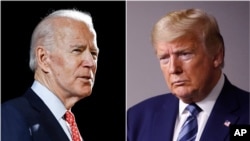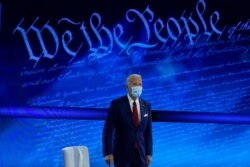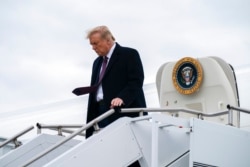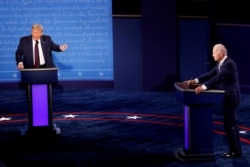As the race for the White House enters the homestretch, U.S. President Donald Trump finds himself at a major campaign cash disadvantage to Democratic challenger Joe Biden.
Campaign filings with the Federal Election Commission (FEC) show the Trump re-election committee with $63 million in cash on hand as of Oct. 1, compared with Biden’s $177 million. Biden’s 3-to-1 cash advantage came as his campaign raised $489 million in August and September, compared with Trump’s just under $143 million.
Overall, the Biden campaign has raised $809 million, more than any other candidate in U.S. history, excluding self-funding billionaire Michael Bloomberg, while Trump’s re-election committee has hauled in $552 million, according to the Center for Responsive Politics, a campaign watchdog organization. Party committees and outside groups have raised and spent even more money on the race.
Big edge in final days
The Democratic candidate’s unprecedented money advantage has enabled him to outspend Trump’s once-flush re-election campaign, flooding the airwaves and social media with advertising in key battleground states in the final days of the campaign.
Biden’s financial edge means he “is going to have a lot more money to spend on basically whatever he wants,” said Douglas Weber, a senior researcher at the Center for Responsive Politics in Washington. “That can be helpful because it means he has the resources if he wants to invest in long-shot states."
To be sure, money alone does not win elections. Democrat Hillary Clinton lost the 2016 presidential election despite vastly outspending Trump. But the extra cash on hand gives Biden a financial advantage in closely fought races in battleground states such as Pennsylvania, Michigan, Wisconsin and Florida.
“The irony in all this is that we think advertising matters the least in a presidential race because voters already know so much else about these presidential candidates,” said Travis Ridout, a professor of government and public policy at Washington State University and co-director of the Wesleyan Media Project, which tracks political advertising. “That said, we think that advertising can make a difference when the race is close.”
Although Biden leads Trump by as much as 10 percentage points in national polling averages, the former vice president’s lead narrows to just a couple of points in swing states that hold the key to the outcome of the election.
'Huge ad advantage'
“Having a huge ad advantage in those states, especially when those undecided persuadable voters are making up their minds, that could make the difference,” Ridout said.
A Trump campaign spokeswoman did not respond to a question about the campaign’s cash deficit compared with that of Biden's campaign. Trump campaign manager Bill Stepien told reporters on Monday that the Trump team had “more than sufficient air cover, almost three times as much as 2016.”
The 2020 U.S. presidential and congressional races are on pace to cost nearly $11 billion, making them more than 50% more expensive than the 2016 elections when adjusted for inflation, according to the Center for Responsive Politics. The presidential race alone is projected to cost $5.2 billion, double what the 2016 presidential race cost.
The Biden campaign’s financial advantage over the Trump team marks a sharp turnaround. Until February, the Trump campaign organization was well-funded, boasting seven times more cash on hand than Biden’s team, according to the CRP.
But the president’s team burned through the money early on and fell behind as Biden’s once-flagging fundraising operation took off this year amid growing Democratic opposition to the president over his handling of the coronavirus pandemic.
“Biden does seem to be attracting a lot of Democrats, a lot of enthusiastic donors,” said Weber of the CRP. “Democrats in general have been doing very well in fundraising this cycle.”
Records set
In August and September, the Biden campaign and affiliated Democratic fund committees set back-to-back fundraising records, hauling in nearly $750 million. The Republicans, by contrast, raised nearly $460 million during the two-month period.
With more money in the bank, the Democrats have been able to out-advertise the Republicans. Ad tracking firm CMAG/Kantar has tracked $932 million in presidential TV and radio ads between Sept. 1 and Election Day, with pro-Biden content accounting for 62% of all ad dollars.
One important caveat: According to the Wesleyan Media Project, which tracks and analyzes federal and gubernatorial election advertising, Trump is outspending Biden on social media by about 22%, while Biden has outspent Trump on television by 28% since April.
In the final days of the campaign, the Democrats are set to spend $142 million on advertising, according to Kantar, outspending the Republicans by more than 2-to-1.
While the Trump campaign has canceled TV ads scheduled for battleground states such as Wisconsin, according to ad-buying company Medium Buying, the Biden campaign has embarked on once unheard-of venture: advertising in the traditionally Republican state of Texas.
“The Trump campaign has had to go into triage mode,” Ridout said. “They can’t afford advertising everywhere in all of the potentially competitive states. So, they've had to pull back from some of those states that they think they should win and pull back from some of those that it is pretty certain Biden's going to win.”







